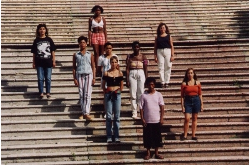VENTRE LIVRE (Liberation)
Director: Ana Luiza Azevedo
Executive Producer: Nora Goulart
Written by: Ana Luiza Azevedo, Giba Assis Brasil and Rosângela Cortinhas
Cinematographer: Alex Sernambi
Art Director: Fiapo Barth
Music by: Leo Henkin
Production Coordinator: Luciana Tomasi
Editor: Giba Assis Brasil
Assistant Director: Amabile Rocha
A Casa de Cinema PoA Production
Main Cast:
Lisa Becker (portuguese and english female narration)
Rui Carvalho (portuguese male narration)
Robin Clein (english male narration)
Ciça Reckziegel (the teacher)
Prizes
- 22nd Gramado Film Festival, 1994:
Best Medium-lenght Film, Best Regional Film, Best Editing of Regional Film, Best Screenplay of Regional Film. - 27th Brasilia Film Festival, 1994:
Special Jury Award, Best Editing in 16 mm. - 18th Guarnicê of Cine-Video, São Luís, 1995:
Best Story, Best Screenplay. - 1st Latinoamerican Festival of Films and Human Rights, Buenos Aires, Argentina, 1997:
Best Documentary.
Reviews
"Ana films with a feminine look of a privileged woman who had the children she chose to have and with the compassion of the sympathetic and sensitive artist. It is a film to be seen over and over again on TV, in schools, in community centers, in the streets, in parks. It is a civic duty to see it."
(Luiz César Cozzatti, JORNAL RS, Porto Alegre, 20/08/1994)
"VENTRE LIVRE (LIBERATION) is a film about inequality. About unequal rights, unequal lives, unequal between rich and poor, between men and women. It presents numbers and statistics, it assumes a discourse but it is never rhetorical. Ana Luiza and her co-writers (...) had the courage to believe in their theme. They did not embellish, they just knew how to listen and to see. And the concern and indignation with which the film was made are plainly visible. And there lies its power."
(David França Mendes, REVISTA IMAGENS, São Paulo, September 1994)
"The power of its arguments, and also the efficacy with which it establishes communication with the viewer, explain why this film (...) won best medium length film at the Gramado Latin Film Festival this year. It does not only state an opinion, it seeks to transmit a conviction, an experience. They take a stand and it is communicated clearly, as a decision and therefore with active political results. It is precisely this character that makes the result so respectable and so necessary."
(Manuel Martínez Carril, REVISTA CINEMATECA URUGUAYA # 238, October 1994)
13/08/1994








